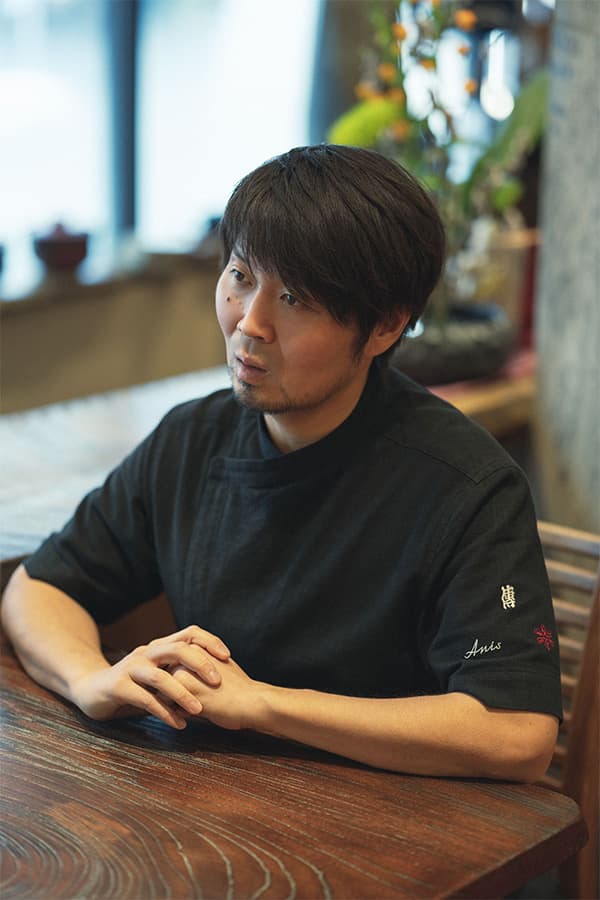Zaiyu Hasegawa [Den]
Chef Zaiyu Hasegawa was born in Tokyo in 1982. Raised by a mother who worked as a geisha in Kagurazaka, he experienced delicious Japanese cooking from a young age. After graduating from high school, he trained for five years at the long-established restaurant Uotoku in Kagurazaka, and opened Den in 2007.
Den embodies a “new style of Japanese cuisine” overflowing with a playful spirit and hospitality while valuing the wide range of ingredients and unique Japanese traditions. In 2022, it was ranked No. 1 in the “Asia’s 50 best restaurants” rankings.
Zaiyuhasegawa
The Japanese restaurant Den in Gaienmae where Zaiyu Hasegawa is the manager has in recent years maintained two stars in the Michelin Guide, and in 2022 it was ranked No. 1 in the “Asia’s 50 best restaurants” rankings. It is known as one of the most difficult restaurants in Tokyo to get a reservation at.
So how does one of the top players in modern Japanese cuisine, both in fact and by reputation, see modern “Tokyo cuisine?”
Mr. Hasegawa, you are participating in this event in a collaboration with Mr. Naoyuki Honda. Can you describe the image that you have of “Tokyo cuisine?”
Hasegawa: In my mind, Kyoto is a large part of Japanese cuisine, and both Kyoto cuisine and Tokyo cuisine can be described as types of local cuisine. Tokyo cuisine has changed little by little from the original Edo cuisine to reach its modern form. The process of this evolution has created an ever-more creative food culture among the ordinary citizens, including sushi, tempura, soba, and unagi. Tokyo now draws gourmet diners from around the world.
I originally trained in an Edo cuisine restaurant, and this was my starting base even as I now hope that I am able to express what Tokyo cuisine means today. That is why I became involved as a supervisor for this special event being produced by Naoyuki. I look forward to being able to work with these exceptional professionals.
How do you feel that this event led by the Tokyo Metropolitan Government will communicate the appeal of Tokyo foods to person in Japan and overseas?
Hasegawa: While of course it is important to boost inbound demand from overseas, I am more interested in helping persons who already live in Japan to better understand the wealth of the cuisine, and the value of the food and its culture.
My basic desire is to increase the number of persons who can say, “This is my favorite restaurant.” There are surprisingly few person who, when asked, can immediately list their top five favorite restaurants. Of course, people are highly varied, and every household is different. Some people are busy with work or do not have time, or maybe are not able to eat out very often. So it is not always true that an expensive meal is a good one.
I hope that overall this event provides an opportunity for people to become more interested in and better understand the value of food.
What do you think the importance is of having a restaurant in Tokyo?
Hasegawa: The reason I run my restaurant in Tokyo is very simple. It is because Tokyo is the place where I was born and raised.
Deciding where to create a restaurant is not an easy decision, and I am aware that local regions each have their own advantages. However I believe that knowing the importance of my own hometown is very necessary for operating a restaurant as well. I have visited many places around the world and traveled to all parts of Japan, however it is Tokyo where I want to live.
Of course, as well as the enjoyment, there are also difficulties with running a restaurant in Tokyo,. However, I suppose that a city like Tokyo or New York, where things move at a speed that is clearly faster than other parts of the world, has a special kind of attraction that makes the city unique.
→This interview was published in the May issue of RiCE.(https://www.rice.press/)





